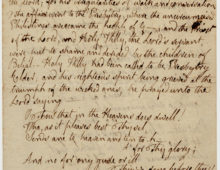Tagged with Independence
Resource : The Velocipede
Invented 200 years ago, the humble bicycle is one of the most popular and enduring innovations of all time. Relatively cheap and simple to produce, environmentally sound, easy and fun to use, great for keeping fit and available to people of all ages and from all walks of life, it is still a significant part of our lives today.
Resource : Túpac Amaru II
Túpac Amaru II was the leader of the largest uprising in colonial Spanish-American history which raged across the Andes from 1780-1783. It became more violent as it progressed, and also more radical, more antislavery, and more anti-Hispanic. Its leader is still remembered in Peru and Bolivia and beyond today.
Resource : Silhouette of Thomas Muir
Thomas Muir was a radical, who campaigned for political reform in Scotland. He was eventually accused of sedition and transported to Australia, following one of the most notorious and controversial trials in Scottish history. He became known as the father of Scottish democracy and one of Scotland’s five ‘political martyrs’.
Resource : Handwritten declaration of American Independence
In the 1700s Britain controlled and governed extensive areas in the Americas and the Caribbean within its empire. In 1776, thirteen of the colonies in North America came together to reject British rule and the sovereignty of King George III over them, and to declare themselves independent states. This was formalised in the Declaration of Independence, the first step towards establishing a new nation – the United States of America. This handwritten version is thought to be one of the very first to reach Britain.
Resource : Memorial to Joseph Blanco White
Joseph Blanco White was a Spanish theologian, writer and poet. He campaigned against intolerance in different ways: against Napoleonic invasion of Spain, for the religious right to convert between churches (which he did from Catholic priesthood to Anglicanism), and in support of the independence of South American countries from Spanish colonial rule. He is best remembered for his sonnet Night and Death which he dedicated to Samuel Coleridge.
Resource : Theobald Wolfe Tone
Wolfe Tone was a founder of the United Irishmen and a leading figure in the fight for Irish independence from British rule. In 1798, Tone led the United Irishmen in a major uprising, hoping to begin a nationalist and republican revolution in Ireland with the support of French troops.
Resource : Statue of Simón Bolívar
This is a statue of the South American revolutionary leader Simón Bolívar. Bolívar became known as El Libertador (‘the liberator’) and founding father of many modern South American countries, such as Venezuela, Bolivia and Columbia. He sought to harness the ideas and independence movements of earlier revolutions (including the French and American revolutions), and find a way to bring them to Central and South America – calling on the written word, the sword, and his own potent charisma to seize opportunities at a time of upheaval and war.
Resource : Episodes from September Days 1830 on the Place de l’Hôtel de Ville in Brussels
This painting by Gustaf Wappers depicts the Belgian Revolution of 1830, which resulted in the independence of Belgium from the Dutch-ruled United Kingdom of the Netherlands.
Resource : Tom Paine’s writing desk
Thomas Paine was a radical political philosopher and advocate of human rights. He was one of the most influential writers and activists of his time who heavily influenced the American and French revolutions.
Resource : Benjamin Franklin after Joseph Siffred Duplessis, based on a work of 1783
Benjamin Franklin (1706–1790) was an American printer, inventor and scientist, who developed an international profile and went on to become a Founding Father of the United States of America, along with men like George Washington, Thomas Jefferson and Alexander Hamilton. He played a key part in the drafting of the Declaration of Independence, the defeat of Britain in the war, and the creation of the American Constitution.


